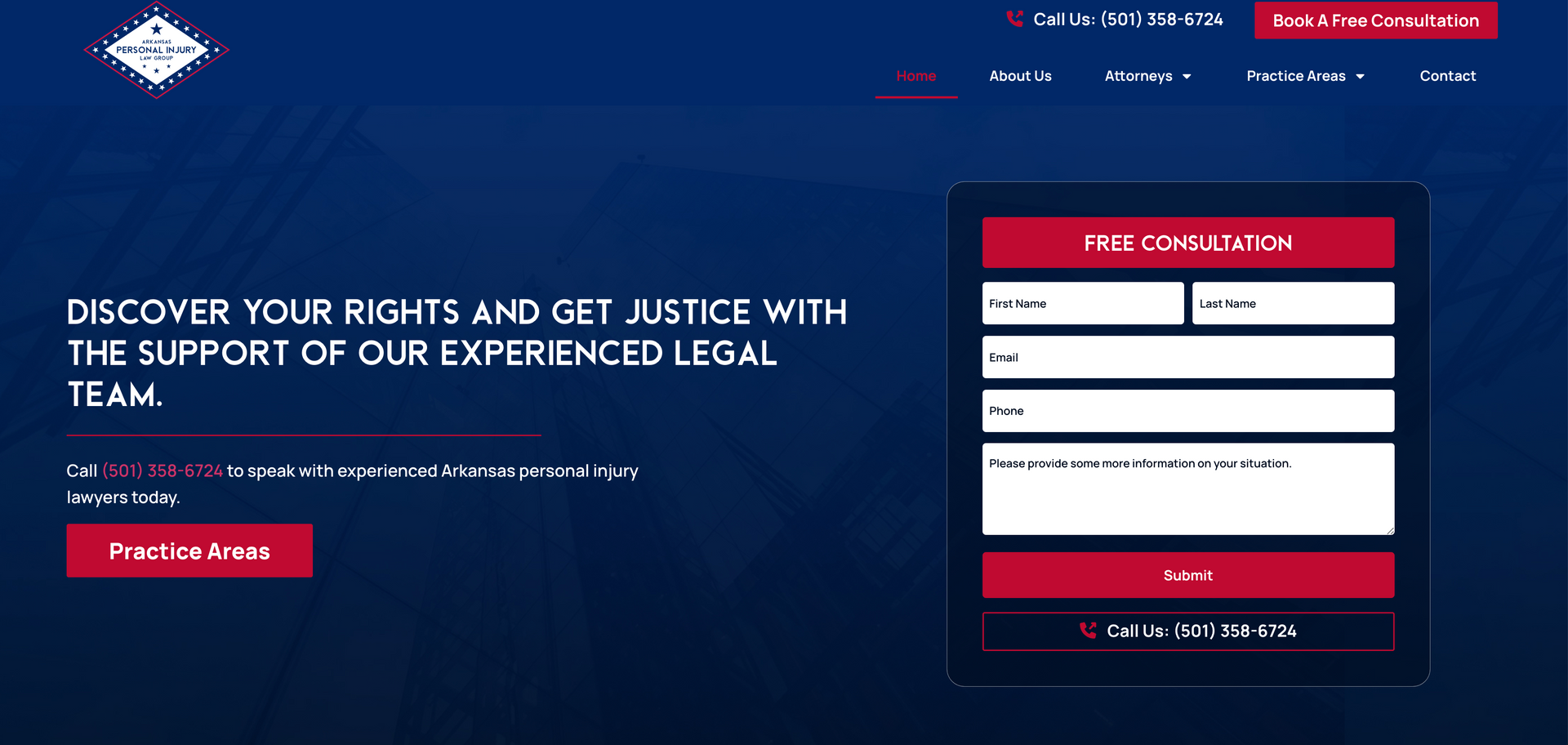The Solo Law Firm Starter Kit: Essential Tools & Tips for 2024
The Solo Law Firm Starter Kit: Essential Tools & Tips for 2024
Starting a solo law practice in 2024? This guide covers tools, strategies, and tips for phone systems, CRM, marketing, website setup, office space, and more. Save time and money. Congratulations! Going solo is an exciting adventure, but it can also be overwhelming. As someone who works with law firms regularly, I've seen many make costly mistakes when getting started.
This starter kit is designed to help you avoid those pitfalls and set up a streamlined, efficient solo practice that will save you time and money.
Phone Systems: Keep It Simple and Affordable
- Openphone: My top pick for most solo attorneys. It's user-friendly, affordable, and has all the features you need without the bloat.
- RingCentral: A close second, but its robust features might be overkill if you're just starting.
- Google Voice: Free, but the buggy interface can be frustrating.
- GoHighLevel: Powerful automation, but overpriced for most solo needs.
Automations: Your Secret Weapon
Zapier is your best friend. Set up automated workflows (called "Zaps") to connect your different tools and save yourself countless hours of manual work. For example, you could automatically create a new client record in your CRM when someone fills out a contact form on your website.
Faxing: When You Need It
While many communications are digital now, you might still need to send or receive the occasional fax. HelloFax (integrated with Dropbox) is a popular and easy-to-use online fax service.
Customer Relationship Management (CRM)
Selecting a CRM that fits your needs without overcomplicating things is key:
- Trello: Ideal for small firms. Simple, free, and effective for managing tasks and client information. You can create boards for different clients or cases, making it easy to track progress.
- Notion: Lightweight and minimal, it offers a versatile workspace that can be customized to fit your firm's needs. Use it for note-taking, task management, and even creating simple databases.
- Stripe: Reliable for billing and integrating with various platforms. It simplifies the payment process, making it easy for clients to pay you online.
Getting Cases: Free Strategies
Building a client base doesn't always have to cost money. Here are some free strategies to explore:
- Tap Your Network: Don't underestimate the power of your existing connections. Reach out to former colleagues, law school classmates, friends, and family. Let them know you've started your own practice and the types of cases you handle.
- Referral Partnerships: Forge relationships with professionals who serve your target clientele. Real estate agents, accountants, therapists, doctors, and even auto body shops can be valuable sources of referrals. Offer to reciprocate by referring clients to them as well.
- Community Involvement: Get involved in your local community.
- Join your local Chamber of Commerce or BNI chapter to connect with other businesses and build referral relationships.
- Offer to be a guest speaker at local events or workshops on topics you're knowledgeable about. This positions you as an expert and can attract potential clients.
- Participate in community events or charity golf outings to network and build brand awareness.
- Give More Than You Receive: Be generous with your time and knowledge. Offer free legal advice or resources online, volunteer your services to local organizations, or speak at community events. This establishes you as an expert and builds goodwill, leading to organic referrals.
- Don't Underestimate Merch: Business cards are a given, but consider creating branded merchandise like hats, vests, or pens. These items can be great conversation starters and keep your firm top-of-mind with potential clients.
Getting Cases: Paid Strategies
Paid advertising can be a powerful way to accelerate your growth, but it's important to be strategic:
- Invest in Facebook/Instagram Ads: While mastering this platform takes time (think 6-12 months), the payoff is huge. Facebook and Instagram's incredibly detailed user data enables laser-focused ad targeting, putting your message directly in front of your ideal clients. This can be especially beneficial for niche practice areas.
- Consider a Website Specialist: In the long run, a well-designed website is a powerful asset. While DIY website builders can get you started, a professional web designer can create a site that truly stands out. A visually appealing, user-friendly site enhances credibility, showcases your expertise, and converts visitors into clients. Think of it as an investment in your firm's growth.
- Think Beyond Google: Google PPC and SEO can be valuable, but the market is often saturated and costly. Explore alternative platforms like YouTube or TikTok, where you can connect with audiences in innovative ways.
By combining free and paid strategies, you can create a multi-faceted approach to attracting and retaining clients for your solo law firm.
Website: Your Digital Storefront
For solo lawyers, a website is one of the most important investments you can make for yourself and your law firm. Think of your website as your virtual office – it's often the first impression potential clients have of your firm. As a law firm marketing agency, we have extensive experience and understanding when it comes to solo lawyer website design.
- Prioritize Professionalism: A poorly designed website can hurt your credibility. Invest in a clean, modern design that reflects your expertise.
- User-Friendly Navigation: Make it easy for visitors to find what they need. Clear calls to action (like "Schedule a Consultation") guide potential clients towards taking the next step.
- Mobile Optimization: Many people browse websites on their phones, so ensure your site looks great on all devices.
- Showcase Your Expertise: Use your website to highlight your experience, practice areas, and successes. Client testimonials and case studies can be powerful tools for building trust.
By focusing on effective paid strategies and a professional website, you're laying the groundwork for sustainable growth in your solo practice. Remember, these are investments in your firm's future success.
Setting Up Your Email/Domain
Choose reliable services to avoid communication issues:
- Domains: Godaddy or Namecheap are trusted providers. They offer competitive pricing and good customer support.
- Email: Outlook via Godaddy or Gmail/Gsuite are both excellent choices. They provide professional email addresses and reliable service. Avoid cheaper platforms like Zoho to prevent deliverability issues, which can send your emails to spam.
- If you're cash-strapped, use regular free Gmail. It's a temporary solution until you can invest in a more professional setup.
Hiring Intake Staff/Reception
Handling calls yourself is fine initially, but as your practice grows, you need a sustainable solution. Hiring Virtual Assistants (VAs) is cost-effective and efficient:
- Top English-speaking VAs: Philippines and Venezuela are known for having highly educated, English-speaking VAs. They can handle calls, manage schedules, and perform other administrative tasks.
- Top Spanish/Bilingual VAs: Look to Nicaragua, Paraguay, Venezuela, Brazil, and Mexico for bilingual support. This can be particularly valuable if you have a diverse client base.
Train them properly using pre-recorded training videos on Loom. Monitor their performance for two weeks to ensure they meet your standards. This investment in training will pay off in better client interactions and smoother operations.
Office Space: Virtual vs. Physical
Consider your office space needs carefully:
- Virtual Office: Many solo practitioners start with a virtual office to save on overhead costs. Services like Regus or WeWork offer virtual office plans that include a professional mailing address, phone answering services, and access to meeting rooms.
- Physical Office: If you prefer a physical office, look for affordable shared office spaces or sublease from a larger firm. This can give you a professional environment without the high cost of leasing your own space.
Legal Research and Document Management
Having reliable tools for legal research and document management is crucial:
- Legal Research Tools: Westlaw and LexisNexis are industry standards, but they can be pricey. Alternatives like Fastcase or Casetext offer more affordable options without sacrificing quality.
- Document Management: Tools like Clio, MyCase, or PracticePanther offer comprehensive case management solutions, including document management, billing, and client communication.
Continuing Legal Education (CLE)
Stay current with your legal knowledge and meet your state’s CLE requirements:
- Online CLE Providers: Websites like Lawline, CLE Center, and the American Bar Association offer a variety of CLE courses online, allowing you to learn at your own pace.
- Local Bar Associations: Many bar associations offer free or discounted CLE courses for their members.
Professional Liability Insurance
Protect yourself and your firm from potential lawsuits with professional liability insurance:
- Providers: Companies like ALPS, Lawyers Mutual, and The Hartford specialize in providing malpractice insurance for solo practitioners.
- Coverage: Make sure you understand what is covered under your policy and choose a plan that fits your practice needs.
Financial Management and Accounting
Keep your finances in order from the start:
- Accounting Software: QuickBooks or Xero are popular accounting software options that can help you manage your firm's finances, track expenses, and generate invoices.
- Professional Accountant: Consider hiring an accountant with experience in law firm accounting to handle your taxes and financial planning.
Networking and Professional Development
Building a strong professional network can provide support and referrals:
- Legal Associations: Join local, state, and national legal associations. These organizations often provide networking events, resources, and opportunities for professional development.
- Mentorship: Seek out mentors who have successfully started their own practices. They can provide invaluable advice and guidance.
By addressing these additional areas, your guide will offer a more comprehensive roadmap for lawyers looking to start their own solo practice. This thorough approach will help ensure they have the necessary tools, strategies, and support to succeed in their new venture. If you have any questions please do not hesitate to contact us. Scale and Sword is a law firm marketing agency.
Let’s talk about your project
Fill in the form or call to set up a meeting at 302 285 9806






